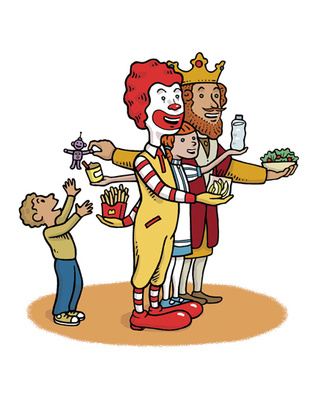 loading
loading
FindingsFast food and childrenMore apples on the menus, but what about those TV ads?  Gregory NemecView full imageObesity rates are leveling off, but the battle for kids’ taste buds is still going strong. Even as parents push for healthy food, the fast-food industry is spending upwards of $4 billion annually on advertising. Meanwhile, a new report by the Yale Rudd Center for Food Policy and Obesity, Fast Food Facts 2013, notes that every day, 33 percent of children and 41 percent of teens consume fast food. The report, a follow-up to a 2010 Rudd Center study, examined 18 of the biggest fast-food chains in the United States, researching both the nutritional quality of their menus and their youth marketing strategies, from old-fashioned TV to social media and the Internet. Mobile game apps are now part of that marketing package, including McPlay from McDonald’s and Pet Play Games from Wendy’s. Fast Food Facts offers some good news. The years 2009–2012 saw a 10 percent decrease in the number of fast-food ads children between ages 6 and 11 saw on television. And most fast-food restaurants now offer some healthy children’s items. (The best nutritional kids’ combination meal is at Arby’s: apple slices, bottled water, and Kraft mac and cheese.) Yet despite the new healthy items for kids, less than 1 percent of all kids’ meal combinations met recommended nutrition standards. Moreover, the majority of children actually consume adult fast-food meals, not meals targeted to kids. As for marketing: most chains increased their total advertising to children. In fact, 19 of the 25 top advertisers had increased their advertising to preschoolers since the previous report. Children and teens still see three to five fast-food ads on television daily. (Six companies are responsible for more than 70 percent of those ads: McDonald’s, Yum! Brands, Subway, Burger King, Domino’s, and Wendy’s.) “Very young children don’t understand that advertising may not always be true, so they need to be shielded even more,” says Jennifer Harris ’08PhD, the Rudd Center’s director of marketing initiatives and lead author of the report. “I recommend that parents of very young children don’t let them watch very much commercial television.”
The comment period has expired.
|
|